七年级下册unit12sectionA课件
人教版七年级下册英语Unit 12 SectionA (Grammar Focus-3c)
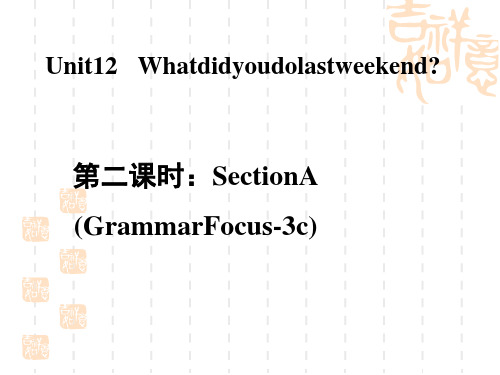
问头
一般过去时
一般现在时
特殊疑问词
特 殊 疑 问
+was/ w+特ae殊drej.+疑+主问其语词他+?主 数 第语 时 三是 , 人第 谓 称三语单人动数称词形单用式。
句
did +主语+ 动词原形+其
他?
典例 YesterdayMom_____B___mesomemoneytobuyadictio nary. [扬州] A. givesB. gave C. hasgivenD. wasgiving
B
_______didyoustayinChangsha?
—Forthreedays. [湘西]
A. HowsoonB. HowlongC. Howfar
【点拨】用关键信息法解题。根据答语“Forthreedays.”可 知,问句询问“多长时间”。
主语 一般过去时和LeiisinterestedinEnglishandhe_____w__a_tc_hes (watch) BBCNewseveryday. [兰州]
一、单项选择
1.—___C__theylastyear?
—TheywereinAmerica.
A. Howwere
B. Howwas
C. Wherewere
知识点
2
FatherMouseshoutedatthecat, “Woof, woof!”
考点2 shout/ʃaʊt/v. 呼叫;喊叫 对……大声喊叫,无恶意,多因距离远
【重点】 辨析shoutat与shoutto
shout 冲……大声叫嚷,吼,非善意 at
shout 对……大声喊叫,无恶意,多 to 因距离远
七年级英语下册(人教版)Unit12第1课时(SectionA1a2c)说课稿
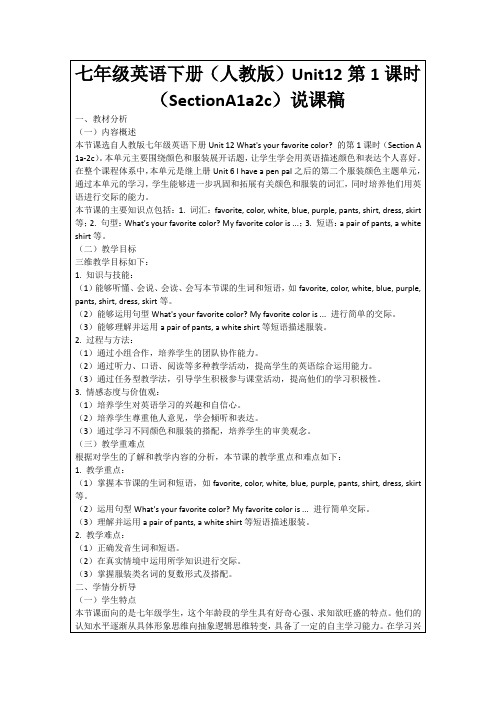
3.不断提高自身教学水平,学习新的教学理念和方法,以适应学生的需求。
(3)掌握服装类名词的复数形式及搭配。
二、学情分析导
(一)学生特点
本节课面向的是七年级学生,这个年龄段的学生具有好奇心强、求知欲旺盛的特点。他们的认知水平逐渐从具体形象思维向抽象逻辑思维转变,具备了一定的自主学习能力。在学习兴趣方面,学生对新鲜事物充满好奇,喜欢通过游戏、互动等形式学习英语。此外,学生在学习习惯上,已初步形成了合作、探究的学习方式,但仍有部分学生依赖性强,需要教师引导和督促。
(二)教学目标
三维教学目标如下:
1.知识与技能:
(1)能够听懂、会说、会读、会写本节课的生词和短语,如favorite, color, white, blue, purple, pants, shirt, dress, skirt等。
(2)能够运用句型What's your favorite color? My favorite color is ...进行简单的交际。
七年级英语下册(人教版)Unit12第1课时(SectionA1a2c)说课稿
一、教材分析
(一)内容概述
本节课选自人教版七年级英语下册Unit 12 What's your favorite color?的第1课时(Section A 1a-2c)。本单元主要围绕颜色和服装展开话题,让学生学会用英语描述颜色和表达个人喜好。在整个课程体系中,本单元是继上册Unit 6 I have a pen pal之后的第二个服装颜色主题单元,通过本单元的学习,学生能够进一步巩固和拓展有关颜色和服装的词汇,同时培养他们用英语进行交际的能力。
(三)பைடு நூலகம்动方式
《初中英语七年级下册第12课》课件

In the afternoon, _d_i_d_m__y_h_o_m__e_w_o_r_k_
On Saturday night, _h_e_lp_e_d__m_y__m_o_t_h_e_r
On Sunday morning, _w_e_n_t_t_o_t_h_e_l_ib_r_a_ry_
In the afternoon, _p_l_a_y_ed__s_o_c_k at the pictures. What did the boy do last weekend? When did he do it? Sunday
3a Look at the pictures and complete the passage. I had a busy weekend. On Saturday morning, I _cl_e_a_n_e_d_m__y_r_o_o_m_. In the afternoon, I _d_id__m__y_h_o_m__ew__o_r_k__. It was a little difficult. On Saturday night, I stayed at home and _h_e_lp_e_d__m_y__m_o_t_h_e_r_ cook dinner. On Sunday morning, I _w_e_n_t_t_o_t_h_e_l_ib_r_a_ry_. I read a book about history. Then in the afternoon, I _p_l_a_y_e_d_s_o_c_c_e_r__ with my friends. On Sunday night, I _w__a_tc_h_e_d_T__V____. I saw an interesting talk show.
新教材七年级英语下册Unit12 what did you do last weekend Section A课件

What did you do on Saturday afternoon?
I went to the beach.
Listen and underline 2a the words you hear. 1. I visited my (aunt / ________ grandma). _________ / sports). 2. I did my (homework 3. I studied for the (English _______ / math) test. 4. I went to a (farm _____/ beach). 5. I fed some (sheep / _____ cows).
natural museum nature
A: What ____Becky did ___last do Saturday morning? B: She_______ visited her grandma. Did A: ____she _____her aunt on Sunday afternoon ? visit B:___,________. No she didn’t
visite (one’s )aunt
visite (one’s) grandma A: Who visited ______her grandma? B: Becky______. did
A: Where ____she did ____on go Sunday morning? stayed at B: She _________home . A: Did she_______________________ study for the English test . B:____,________________________. No she studied for the math test
人教版七年级英语下册教学课件(RJ) Unit 12 Section A (focus-3c)
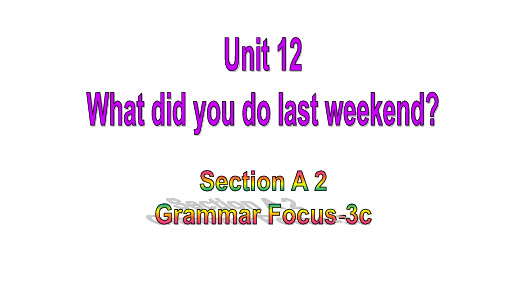
4.John and his sister __p_l_a_y_e_d_ ___b_a_d_m__i_n_t_o_n__ yesterday afternoon. 5.Mike __w_e_n_t_ _b_o__a_ti_n_g_ last weekend.
3a Fill in the blanks with who, what, when, where or how.
1. A: __W__h_a_t__ did you do last weekend?
B: I played badminton on Saturday.
A: Sounds fun! __W__h_o__ did you play with?
—Yesterday morning.昨天上午。 —Who did you go there with?你和谁去那儿? —Tom.汤姆。 【注意】在否定句和疑问句中,如果出现了助动词did,后面的谓语动词应还 原为原形。
Translate
1. 我上周去看爷爷奶奶了。 I visited my grandparents last week.
___D_i_d__ Linda __v_is_i_t_ the museum last weekend?
3.托尼刚才在房间做作业。(翻译句子)
Tony __d__id__ __h__is_ ___h_o_m__e_w__o_r_k_ in his room just now.
4.我们星期天下午去动物园了。(翻译句子)
一、根据句意及图片提示完成下列句子,每空一词。
1.Would you like to go _c_a_m__p_i_n_g_ with me this weekend? 2.There is a _l_a_k_e_ in the park. 3.—How was your vacation on the__b_e_a_c_h__?
人教版初中英语七年级下册Unit12SectionA教材全解

人教版初中英语七年级下册Unit12SectionA教材全解Unit 12 What did you do last weekend?Unit 12 Section A教材全解1.go boating去划船【重点注释】这是“go+doing”结构的短语,类似的还有:go swimming/fishing/shopping/skating/camping去游泳/钓鱼/购物/滑冰/野营。
2.camped by the lake在湖边野营【重点注释】①camp此处作不及物动词,意为“扎营,宿营”,常用短语go camping意为“去野营”,camp out意为“野营;露营”。
例如:We camped near the beach.我们靠近海滩宿营。
Where did you camp last night?昨晚你在哪里宿营了?They often go camping on summer holidays.他们经常在暑假去野营。
I went camping with my friends last Sunday.上星期日我和朋友们去露营了。
The students love camping out on summer holidays.学生们喜欢在暑假中露营。
【拓展记忆】camp还可作名词,意为“野营,营地“,可构成词组:summer camp夏令营,winter camp冬令营。
例句:Let’s go back to the camp.It’s getting dark.我们回营地吧。
天快黑了。
We had a good week at the camp.我们在营地过了愉快的一周。
Did you go to summer camp last year?去年你参加夏令营了吗?②by the lake在湖边,by此处是介词,意为“在……旁边”、“在……近旁”、“在……手边”,此时要注意它与介词near有所不同,即by表示的距离更“近”。
新目标(人教)七年级下册英语教学课件 Unit 12 Section A(2a-2d)

/ˈbʌtə(r)flaɪ/ n. 蝴蝶
Lisa: Yeah, it was fun. They have a butterfly house with over 200
visitor /ˈvɪzɪtə(r)/ n. 游客;参观者
kinds of butterflies! I told the visitors about them and their
A: Hi, Mike. What did you do last weekend? B: I watched TV, and then I went fishing
with my father. A: How was your last weekend? B: It was boring.
Names
【用法详解】 sheep是可数名词,意为“羊;绵羊”,其复数形式仍然是sheep。 ➢Sheep are eating grass in the fields. 羊在田野里吃草。
单复数同形的可数名词: 中日鱼羊鹿,是单也是复。
(注:中 — Chinese 日—Japanese 鱼—fish 羊—sheep 鹿—deer)
Listen again and fill in the chart.
Who Becky Carol Jack
Weekend activities visited her grandma, did her homework stayed at home, studied for the English test
Read the sentences in 2a and say the original forms of verbs.
1. ___ I visited my (aunt/ grandma). visit 2. ___ I did (my homework/ sports). do 3. ___ I studied for the (English/ math) test. study 4. ___ I went to a (farm/ beach). go 5. ___ I fed some (sheep/cows). feed
Unit 12 Section A一般过去时 课件 人教版英语七年级下册
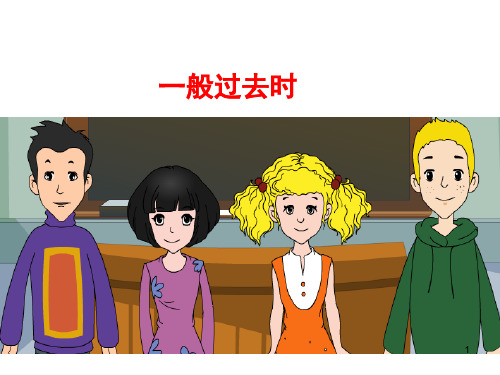
实意动词一般过去时:
变化规则
动词原形 过去形式
一般动词词尾加-ed look
looked
play
以字母e结尾的动词, live
直接加-d
use
以一个辅音字母加y结 worry 尾的动词,变y为i, study 再加-ed
played lived used worried studied
以重读闭音节结尾的 stop 动词,先双写最后一 plan 个辅音字母,再加-ed
ride a horse feed chickens do homework go to a countryside pick strawberries milk a cow
7
III. 写出下列单词的过去式
talk talked
milk milked
am /is was
are were
go went
Stopped planned
4
went for a walk milked a cow
rode a horse
5
fed chickens talked with a farmer took some photos
6
Past过去
Present现在
rode a horse fed chickens did homework went to a countryside picked strawberries milked a cow
4. 最后,还要再通读一遍短文,再重点 看一下动词的一般过去式有没有搞错。 看句子是否通顺。
18
On Saturday morning, I … On Saturday afternoon, I … On Saturday evening, I … On Sunday morning, I … On Saturday afternoon, I … On Saturday evening, I …
人教版七年级英语下册教学课件《Unit 12 Section A Grammar Focus-3c》
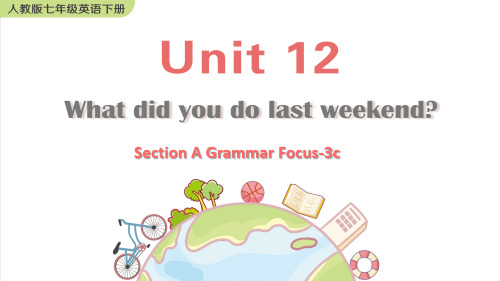
昨天下午他们在哪里? _W__h_e_r_e_ _w_e_r_e_ they yesterday afternoon? 昨天晚上谁在教室里? W__h_o_ w__a_s_ in the classroom last night? 昨天你为什么迟到了? _W__h_y_ _w_e_r_e_ you late yesterday?
He did his homework on Saturday morning.
What did he do last Saturday?
He went boating on Saturday afternoon.
What did he do last weekend?
He played badminton. Who did he play with? He played with his sister.
What did you do last weekend? Who visited her grandma? Where did she go last weekend?
Who did she go with?
I did my homework./ We went boating. Becky did.
1. A: _W__h_a_t__ did you do last weekend? B: I played badminton on Saturday. A: Sounds fun. W ___h_o__ did you play with? B: I played with my father. He’s really good!
3c Think of two things you did last weekend. Draw pictures of them. Your classmates
Unit 12 Section A 第2课时示范公开课教学PPT课件【英语人教新目标七下】

Warming-up Presentation
Practice Production Summary
Make sentences with who or what. In these questions, who/what is the subject or the object.
1. Somebody broke the window. Who broke the window?
Warming-up Presentation
Practice Production Summary
Read about Lisa’s journey to Madrid aloud and answer the questions.
1. Where did Lisa go last weekend? She went to Madrid.
sentences of the simple past tense.
form of the verb.
Warming-up Presentation
Practice Production Summary
Look and fill
1 — Who _d_i_d_ Sally __se_e_? — She saw Bob.
great evening.
Warming-up Presentation
Practice Production Summary
Read and circle
1. — When / How did Sally meet Bob? — At 9 o’clock.
2. — Who / Where did Sally go? — She went to London.
Unit12 (SectionA Grammar Focus-3c)-七年级英语下(人教新目标)

Presentation 一般过去时的特殊疑问句
含be动词的特殊疑 特殊疑问词 + was/were + 主语 + 其他?
问句
特殊疑问词(主语) + was/were + 其他?
人教版 英语 七年级下册
Unit 12 What did you do last weekend?
Section A Grammar Focus-3c
Warming up—Grammar Focus—Presentation—Exercises —Summary—Homework
Learning goals
日本。
每天早上读英语。
Presentation
一般过去时
一般现在时
谓语动词使用过去式,没有人称和数
谓语 的变化( was和were除外) 动词 Julia did her homework and I did some 不同
reading after class yesterday. 昨天下课
后,朱莉娅做作业,我看书。
【特别提醒】通常情况下,一般现在时与频 度副词连用,但一般过去式也可与频度副词 连用,表示过去经常或反复发生的动作。
Presentation
Ask and answer, then complete sentences according to the conversations in 3a.
1. I __p_la_y_e_d_b_a_d_m__in_t_o_n__ on Saturday. 2. I played badminton __o_n_S_a_t_u_r_d_ay_______. 3. I played badminton with ____m_y__f_at_h_e_r______. 4. I went to ____t_h_e_b_e_a_c_h______ with my parents last weekend. 5. He lost ______h_is_k_e_y_s______ yesterday. 6. He lost his keys _____y_e_st_e_rd_a_y______. 7. _____J_im___________ lost his keys yesterday.
人教版英语七年级下册:(Unit 12)Section A(1a~2d)【教案】
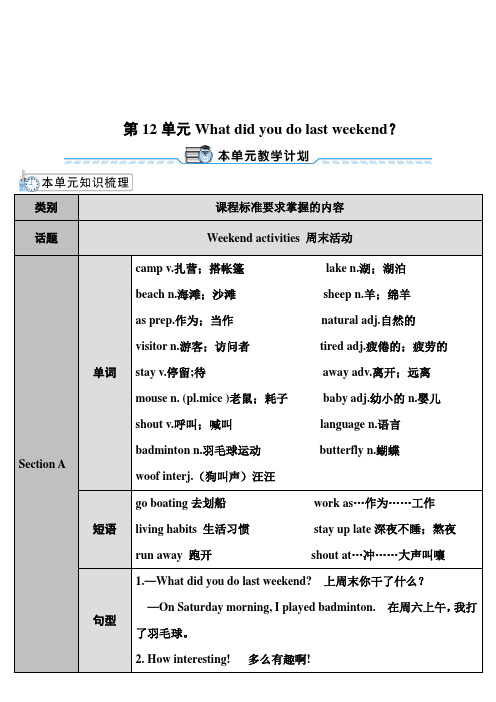
第12单元What did you do last weekend ?类别课程标准要求掌握的内容话题Weekend activities 周末活动Section A 单词camp v.扎营;搭帐篷lake n.湖;湖泊beach n.海滩;沙滩sheep n.羊;绵羊as prep.作为;当作natural adj.自然的visitor n.游客;访问者tired adj.疲倦的;疲劳的stay v.停留;待away adv.离开;远离mouse n. (pl.mice )老鼠;耗子baby adj.幼小的n.婴儿shout v.呼叫;喊叫language n.语言badminton n.羽毛球运动butterfly n.蝴蝶woof interj.(狗叫声)汪汪短语go boating去划船work as…作为……工作living habits 生活习惯stay up late深夜不睡;熬夜run away 跑开shout at…冲……大声叫嚷句型1.—What did you do last weekend? 上周末你干了什么?—On Saturday morning, I played badminton. 在周六上午,我打了羽毛球。
2. How interesting! 多么有趣啊!句型1. I was so tired that I went to sleep early. 我是如此疲劳以至于早早地去睡觉了。
2. We saw a big snake sleeping near the fire. 我们看见一条大蛇正在篝火旁边睡觉。
3. My dad told me later that snakes don’t have ears but can feel things moving. 我的爸爸后来告诉我蛇没有耳朵但能感知东西在移动。
语法一般过去时(二)写作描述周末活动知识目标一般过去时态(Ⅱ)能力目标掌握一般过去时态的各种句式变化;运用过去时态谈论过去发生的事情;能够用日记的形式记录一天的活动并表达感想。
人教版七年级下Unit 12Section A课件

2. —How was your vacation? —It was pretty good. how 是用来提问状况的, 该句型等同 于What do you think of…….? 例如: ①--How was your weekend? --It was great. ②What did you think of your vacation?
3.
--How was the weather? --It was hot and humid. 此处的How was the weather? 用 于提问天气, 等同于句型 What was the weather like?
2. Fill in the blanks with the words from the box.
Choose a place to have a trip, and make a new conversation with your partner. 参考句子: How is it going? Where did you go? How was your vacation? How was the food/people/ weather?
What did the people think of their vacations?
How were the beaches?
They were beautiful.
Complete your vacations :
last summer I went ____(go) to the was (is) pretty beach . My vacation___ went (go) there by bus and good . I_____ was (is) relaxing . The my bus trip___ was (is) very beautiful . It___ was (is) beach___ sunny, cool and humid .the people were ______(are) friendly and the were (are) delicious .I food_____ _______(enjoy) my vacation very enjoyed much and I hope to go there again .
人教版七年级英语下册:unit12SectionA

1.Ivisitedmy(aunt/gra_n_d_m__a_).__ 2.Ididmy(ho_m_e_w__o_rk__/s_ports). 3.Istudiedforthe(En_g_li_s_h_/m__ath)test. 4.Iwenttoa(far_m_/_b_e_ach). 5.Ifedsome(sheep/cow_s_)_. __
Whodidshegowith? ____________________________
Shewentwithherclassmates.
一、一般过去时态的特殊疑问句。 1.句中有系动词Be 特殊疑问词+was/were+主语+其他? 上个周末你过得怎么样? _____H__o_w_wyoaus rlastweekend?
Whatdidyoudol astweekend,LiL ei?
Well,onSaturdaym orning,Iplayedsocc er.
1Lbistenandwritetheday,morning,afternoo
nornightbeloweachpicture.
Sundaynight
Saturdaynight
2bListenagain.WriteCforCarol,JforJack
orBforBeckynexttothestatementsin 2a.
1.__B_Ivisitedmygrandma. 2.__B_Ididmyhomework. 3.__C_IstudiedfortheEnglishtest. 4.__J_Iwenttoafarm. 5.__J_Ifedsomecows.
Howinterestingthebookis!
Unit12SectionA(1a-2d)课件-广东省廉江市实验学校人教版七年级英语下册

at night, Iw__e_n_t_t_o_t_h_e__c_in__em__a_.
Bob: Cool. What about Sunday? 状元成才路
Lucy: In the morning, I _c_a_m_p__e_d by the lake with my classmates. In the afternoon, weI _d_id__m__y__h_o_m__e_w_o_r_k_.
How was your last weekend ? It was terrible.
How was your trip last week ? It was great.
1a Match the activities with the pictures [a-f].
1. did my homework __a__ 2. went to the cinema _d___ 3. went boating __e__ 4. camped by the lake __f__ 5. went to the beach __b__ 6. played badminton __c__
go camping 去露营 go to the beach 去沙滩
lake
deer 鹿
beach
fish 鱼
Chinese 中国人
badmi状n元成才t路 on Japanese 日本人
状元成才路 状元成才路
羊;绵羊状元成才路sheep 作为;当作 as
as a student 作为一个学生 work as + 职业 从事......职业
人教版七年级下册英语Unit 12 课时1 Section A (1a-2d)
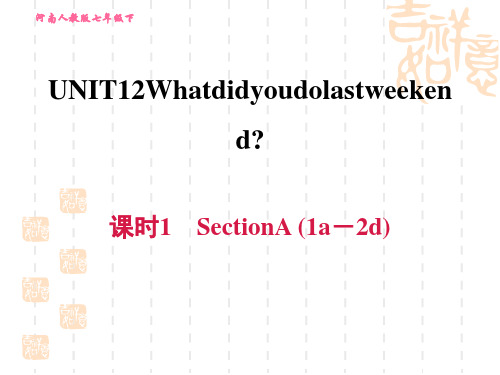
UNIT12Whatdidyoudolastweeken d?
课时1 SectionA (1a-2d)
1 lake
基础巩固练 提示:点击 进入习题 6 camped
2 tired
7 sheep
3 beach
8 visitors
4 As
9 butterflies
5 stay
10 natural
28 Whatdidyoudolastweekend
24 as
29 Doyouoftenclimbthemountains
25 but 30 Wouldyouliketogowithme
一、根据句意及汉语提示完成单词。 1. Mymotherlikestogoforawalkbythesterday, help, mother, your, did, the, clean, you, house _____________________________________________?
Didyouhelpyourmothercleanthehouseyesterday
19 Whendidthechildrengotothefarm Didyouhelpyourmothercleanthehous
20 eyesterday
21 On
能力提升练
26 Itwasgreat/Great/Wonderful
答案呈现
22 of
27 Iplayedbasketball
23 At
答案呈现
wenttothem 11 ovies
基础巩固练
16 Whatdidhedolastweekend
12 livinghabits 17 Igotupearlythismorning
人教版人教版七年级英语下册Unit-12复习课件-PPT17张

go to the library
fly a kite
swim in a swimming pool
sang and played the guitar
studied for a test
had dinner with friends
went to the library
flew a kite
swam in a swimming pool
1. This woke the snake up and it moved into the forest near the lake. 这吵醒了蛇,它移动到湖边的森林里面去了。2. My father told me later that snakes don’t have ears but can feel the things moving. 之后,我的爸爸告诉我蛇没有耳朵但是可以感觉到东西在移动。3.He also told me that it was important not to go near a snake. 他也告诉我重要的是不要靠近蛇。4. This was a very useful lesson for me. 这对于我是非常有用的经验。
where
India
Last weekend
when
A weekend to remember
who
Lisa and her family
how
By bus
what
camp
put up tents
make a fire
cook food
tell stories
near the fire
where
Lisa
had a great weekend
七年级英语下册Unit 12 SectionA (1a-2d)

上个星期天他去海滩了。
1b
Section A1b.wav
Listen and write the day, morning, afternoon or night below each picture.
A. set out
C. work out
B. check out
D. give out
考向二【重点】as在此处用作介词,意思是“作为,当作”。 eg: He works as an actor.他是一名演员。
As a student,you should study hard for our
1c
Role-play. Student A is Lucy. Student B asks Lucy
about her weekend.
B: What did you do last weekend, Lucy?
A: Well, on Saturday morning, I played badminton.
Teacher: Wow, good for you. Jack, how about you? Where did you go?
Teacher: Sounds like you had fun.
2c
Student A asks questions with who, what or where and Student B answers. Then change roles. —Who visited her grandma? —Becky did.❹
- 1、下载文档前请自行甄别文档内容的完整性,平台不提供额外的编辑、内容补充、找答案等附加服务。
- 2、"仅部分预览"的文档,不可在线预览部分如存在完整性等问题,可反馈申请退款(可完整预览的文档不适用该条件!)。
- 3、如文档侵犯您的权益,请联系客服反馈,我们会尽快为您处理(人工客服工作时间:9:00-18:30)。
祈使句 Example: 肯定祈使句 1. Sit down. 2. Come in. 3. Eat at home. 4. Listen to music outside.
表示请求,命令等语气的句子, 其结构 为省去主语you的简单句 . Don’t sit down. Don’t come in . Don’t eat ak at school.
Don’t listen to music outside.
Don’t do your homework at school.
Talk about our school’s rules in groups and make a list.
Use we can’t…
we have to…
Can we arrive late for class? No, we can’t. Don’t arrive late for class.
Can we run in the hallways. No, we can’t. Don’t run in the hallways.
Don’t listen to music in the classroom or the hallways. We can’t listen to music in the classroom or the hallways, but we can listen to music in the music room
Can we eat in the classrooms
No, we can’t. Don’t eat in the classrooms.
Can we listen to music in the classroom or the hallways.
No, we can’t. Don’t listen to music in the classroom or the hallways.
Can you fight in school? No , we can’t. Can you fight with others? fight
No, we can’t.
Don’t fight .
Can we play it in the classrooms?
No, we can’t . But we can play it outside. (在外面)
用have to或has to填空 1.We have to clean our classroom after school. has to 2.She make her bed after getting up. 3.It’s late. Mr Beckman has to go to work by car. 4.Emily and Peter join a music club. have to practice guitar every day. They
Don’t play sports in the classrooms.
Don’t eat in class. We can’t eat in class, but we can eat in the dining room. Don’t play sports in the classrooms. We can’t play sports in the classrooms ,but we can play sports outside.. Don’t fight . We can’t fight with others.
作战
fight with sb.
同某人打架
fight the fire 救火 4 else 其它的,用来修饰something , anything , nothing等,还可用来修饰疑 问词 what , where , who 等,else修饰 疑问词或不定代词时,应后置. Do you have anything else to do .
Who else did see ?
Do we / you have to …? Yes,I do. No,I don’t.
Practice
School rules
1.Clean the classroom every day.
2. Get to school before 7:20. 3. Wear sports shoes for gym class. 4. Keep quiet in class.
Don’t talk in class.
Don’t listen to music in the classrooms.
Don’t run in the hallways.
Don’t play cards in school.
Don’t smoke .It’s bad for your health.
Notes :
1 arrive in / at + 地点
get to +地点
reach +地点 (到达某地方 )
2 class 班 ,课 在课堂上 上课
in class
have classes
be late for class
上课迟到
3 Don’t fight .
不要打架.
fight
战斗,
斗争,
